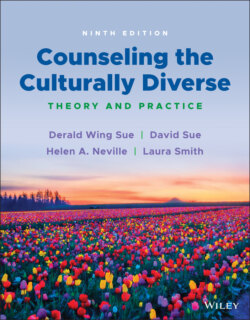Читать книгу Counseling the Culturally Diverse - Laura Smith L. - Страница 25
RECOGNIZING AND UNDERSTANDING RESISTANCE TO MULTICULTURAL TRAINING
ОглавлениеAs a counselor or therapist working with clients, you will often encounter psychological resistance or, more accurately, client behaviors that obstruct the therapeutic process or sabotage positive change (Ivey, Ivey, & Zalaquett, 2018). Clients may change the topic when recalling unpleasant memories, externalize blame for their own failings, fail to acknowledge strong feelings of anger toward loved ones, or be chronically late for counseling appointments. All of these client behaviors are examples of resistance or avoidance of acknowledging and confronting unpleasant personal revelations. Oftentimes, these represent unconscious maneuvers to avoid fearful personal insights, to avoid personal responsibility, and to avoid painful feelings. In most cases, resistance masks deeper meanings outside the client's awareness; tardiness for appointments is unacknowledged anger toward therapists, and changing topics in a session is an unconscious deflection of attention away from frightening personal revelations. In many respects, multicultural training can be likened to “therapy” in that trainees are analogous to clients, and trainers are comparable to therapists helping clients with insights about themselves and others.
As we shall see in Chapter 2, the goal of multicultural training is cultural competence. It requires trainees to become aware of their own worldviews, their assumptions of human behavior, their misinformation and lack of knowledge, and, most importantly, their biases and prejudices. Sometimes, this journey is a painful one, and trainees will resist moving forward. For trainers or instructors, the job is to help trainees in their self‐exploration as racial/cultural beings, and the meaning this has for their future roles as multicultural counselors. For trainees, being able to recognize, understand, and overcome resistance to multicultural training is important in becoming a culturally competent counselor or therapist. In many respects, to be uncomfortable and to experience negative reactions to the material may be signs of potential growth. In the next few sections, we focus upon identifying how resistance manifests itself in training and propose reasons why many well‐intentioned trainees find multicultural training disconcerting and difficult to undertake. By so doing, we are hopeful that trainees will attend to their own reactions when reading the text or when participating in classroom dialogues on the subject.
In work with resistance to diversity training, research reveals how it is likely to be manifested in three forms: cognitive resistance, emotional resistance, and behavioral resistance (Sue, 2015). Recognizing the manifestation and hidden meanings of resistance is one of the first priorities of multicultural training for both trainees and trainers. For trainees, it is finding the courage to confront their own fears and apprehensions, to work through the powerful emotions they are likely to experience, to explore what these feelings mean for them as racial/cultural beings, to achieve new insights about themselves, and to develop multicultural skills and behaviors in their personal lives and as mental health professionals. For trainers, it means understanding the nature of trainee resistance, creating a safe but challenging environment for self‐exploration, and using intervention strategies that facilitate difficult dialogues on race, gender, sexual orientation/identity, and other topics in the area of diversity.
